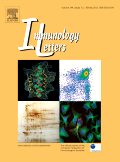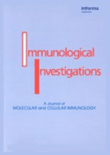
International Journal of Immunogenetics
metrics 2024
Bridging Knowledge Gaps in Immunology and Genetics
Introduction
International Journal of Immunogenetics, under the esteemed publication house WILEY, serves as a pivotal platform for researchers and professionals in the fields of immunology and genetics. With an ISSN of 1744-3121 and an E-ISSN of 1744-313X, this journal offers a rich repository of scholarly articles and research findings that advance our understanding of immune system genetics. Hailing from the United Kingdom, the journal maintains an impactful presence with category quartiles reflecting a Q3 rating in Genetics and Immunology and a Q2 in Medicine (miscellaneous), positioning it as a credible source of scientific knowledge. It encompasses studies from converged years ranging from 1974 to 1996 and again from 2005 to 2024, ensuring a robust collection of both historical and contemporary research. Researchers are encouraged to engage with its content, given its Scopus rankings—highlighting the journal’s relevance in a competitive academic landscape. As an open-access title, International Journal of Immunogenetics strives to enhance accessibility to vital research, fostering collaboration and innovation in the genetic and immunological domains.
Metrics 2024
 0.67
0.67 2.30
2.30 2.00
2.00 49
49Metrics History
Rank 2024
Scopus
IF (Web Of Science)
JCI (Web Of Science)
Quartile History
Similar Journals

CRITICAL REVIEWS IN IMMUNOLOGY
Exploring the Nuances of Health and DiseaseCRITICAL REVIEWS IN IMMUNOLOGY, published by BEGELL HOUSE INC, is an essential journal in the field of immunology that has been contributing to the scientific discourse since 1980. With its ISSN 1040-8401 and E-ISSN 2162-6472, this journal provides a platform for critical analysis and comprehensive reviews that deepen understanding of immune responses and their implications in health and disease. Although currently categorized in the Q4 quartile for Immunology and Q3 for Immunology and Allergy, the journal's quality research and scholarly contributions are crucial for advancing knowledge within its fields—encompassing various aspects of innate and adaptive immunity. Researchers and professionals in immunology will find invaluable insights, aiding them in their quest for innovation and excellence, as the journal aims to foster interdisciplinary collaboration. While it does not operate on an open-access model, CRITICAL REVIEWS IN IMMUNOLOGY remains a significant resource for those dedicated to pushing the boundaries of immunology, with annual publications expected to last well into 2024 and beyond.

IMMUNOLOGY LETTERS
Advancing Immunological Insights for Global ImpactIMMUOLOGY LETTERS, published by Elsevier, is a distinguished journal in the field of immunology, focusing on the latest advancements and findings that significantly influence immunological research and clinical applications. Established in 1979, the journal has evolved to cater to a global readership, featuring high-quality peer-reviewed articles across a diverse spectrum of topics related to immunity and allergic responses. With an impressive Q2 category ranking in both Immunology and Allergy as of 2023, it holds a strong position within the scientific community, evidenced by its commendable Scopus rankings (Rank #71/233 in Medicine - Immunology and Allergy and Rank #85/236 in Immunology and Microbiology - Immunology). While primarily subscription-based, the journal aims to foster knowledge dissemination that encourages collaboration among researchers and practitioners alike, making significant contributions to the understanding of immune mechanisms. The journal is integral for educators, students, and professionals aiming to stay abreast of current trends and breakthroughs in the immune system's intricate functions.

Immunological Medicine
Pioneering Discoveries in Immunology and AllergyImmunological Medicine, published by Taylor & Francis Ltd, is an esteemed open-access journal that has made significant strides in the field of immunology since its establishment in 2018. With an E-ISSN of 2578-5826, the journal has quickly gained recognition for its contribution to advancing immunological research, evidenced by its impressive ranking in the Q2 quartile for both immunology and allergy. Positioned in the United Kingdom, it offers a platform for publishing high-quality original research, reviews, and case studies that delve into the complex interactions of the immune system and its implications for human health. The journal serves as a vital resource for researchers, professionals, and students engaged in the burgeoning fields of immunology, providing open access to a wide audience and fostering collaboration and innovation. With a current Scopus ranking of #81 out of 233 in Immunology and Allergy and #97 out of 236 in Immunology and Microbiology, the journal aims to enhance the visibility and impact of cutting-edge research by bridging the gap between academia and clinical practice.

Immunity
Illuminating the path to understanding immune mechanisms.Immunity is a premier journal published by CELL PRESS that has positioned itself at the forefront of immunological research since its inception in 1994. With its ISSN 1074-7613 and E-ISSN 1097-4180, this prestigious journal is recognized for its significant contribution to the fields of Immunology, Allergy, and Infectious Diseases, consistently achieving a Q1 ranking in these categories as per 2023 metrics. The journal is highly esteemed within the academic community, holding impressive Scopus rankings—4th out of 344 in Infectious Diseases and 3rd in both Immunology and Immunology and Allergy—placing it in the 98th percentile. Although not an Open Access journal, it provides critical insights and research developments that empower researchers, healthcare professionals, and students alike. With a commitment to advancing scientific knowledge, Immunity is crucial for those interested in understanding immune responses and their implications for health and disease.

Cellular & Molecular Immunology
Advancing Immunological FrontiersCellular & Molecular Immunology is a prestigious peer-reviewed journal published by the CHIN SOCIETY IMMUNOLOGY. As a leading journal in the fields of immunology and infectious diseases, it proudly holds a Q1 designation across multiple categories, including Immunology, Allergy, and Medicine (Miscellaneous), reflecting its commitment to excellence and impactful research. With an ISSN of 1672-7681 and an E-ISSN of 2042-0226, the journal has been essential reading since its inception in 2004, continuously gathering insights from cutting-edge studies. It ranks impressively within Scopus, with positions in the 7th, 8th, and 9th percentile in relevant categories, establishing it as a cornerstone for researchers, clinicians, and students alike. The journal offers an extensive range of original research articles, reviews, and clinical studies, ensuring that readers stay at the forefront of immunological discovery. Whether you are interested in basic immunology, infectious diseases, or evolving therapies, Cellular & Molecular Immunology serves as an invaluable resource for advancing your knowledge and engagement in this dynamic field.

Molecular Biology Research Communications
Illuminating the complexities of life at the molecular level.Molecular Biology Research Communications is a distinguished academic journal published by Shiraz University, focusing on the critical and rapidly evolving fields of biochemistry and molecular biology. With an ISSN of 2322-181X and an E-ISSN of 2345-2005, this journal serves as an essential platform for researchers, professionals, and students to disseminate significant findings that contribute to the advancement of knowledge in these disciplines. The journal, operating from Shiraz, Iran, is notable for its contributions from both local and international scholars, offering invaluable insights and fostering scientific collaboration. Although currently indexed in the Q4 quartile across its categories, the journal aims to enhance its impact and visibility in the field as it converges years of research from 2017 to 2024. While the open access option is not available, the journal's commitment to high-quality peer-reviewed research provides a respected avenue for publication.

JOURNAL OF IMMUNOLOGY
Championing Cutting-edge Immunological StudiesWelcome to the JOURNAL OF IMMUNOLOGY, a prestigious publication associated with the American Association of Immunologists and dedicated to advancing the field of immunology. With a rich history dating back to 1945, this journal is renowned for its high-impact research, evident in its notable 2023 Q1 rankings in both Immunology and Allergy, as well as its strong positions in Scopus rankings—Rank #68 in Immunology and Allergy and Rank #79 in Immunology and Microbiology. Although it operates on a subscription basis, its commitment to publishing cutting-edge studies ensures that it remains a vital resource for scientists, healthcare professionals, and students alike. As the journal continues to pave the way for innovative research and breakthroughs in immunological science, it facilitates a platform for dialogue and discovery among researchers and practitioners across the globe.

BMC IMMUNOLOGY
Fostering Collaboration in Immunological DiscoveriesBMC Immunology is a prominent open-access journal published by BMC that has been at the forefront of immunological research since its inception in 2000. Based in the United Kingdom, this journal aims to advance the understanding of immune system functions and disorders through high-quality, peer-reviewed articles. With an impressive scope encompassing various facets of immunology, BMC Immunology has earned a Q3 ranking in the Immunology category according to the 2023 category quartiles, demonstrating its growing impact and relevance in the scientific community. Researchers and professionals will find valuable insights in its array of published works, spanning both foundational studies and innovative applications. The journal's commitment to open access ensures that cutting-edge research is freely available, fostering collaboration and advancement in the field. For those looking to stay updated on the latest developments in immunology, BMC Immunology stands as an essential resource for researchers, professionals, and students alike.

IMMUNOLOGICAL INVESTIGATIONS
Navigating the Evolving Landscape of Immunological InvestigationsIMMUNOLOGICAL INVESTIGATIONS, published by Taylor & Francis Inc, is a leading journal in the field of immunology and related medical sciences, with an established presence since 1972. With a focus on cutting-edge research and critical insights in immunological methods and theories, this journal serves as a pivotal platform for researchers, professionals, and students alike. Though it currently holds a Q3 ranking in Immunology and a Q2 ranking in miscellaneous medicine as of 2023, its Scopus rank of #129 out of 236 reflects its dedication to advancing the understanding of immune responses and therapies. The journal's commitment to rigorous peer review and high-quality publications enables it to remain relevant and influential in the ever-evolving landscape of immunological research. Subscription is required to access its extensive archive, which spans critical developments in the field of immunology from 1972 to 2024.

EUROPEAN JOURNAL OF IMMUNOLOGY
Cultivating Excellence in Immunology ResearchWelcome to the European Journal of Immunology, a premier peer-reviewed journal dedicated to advancing the field of immunology and allergy research. Established in 1971 and published by Wiley, this esteemed journal has been consistently ranked in the top quartile (Q1) across its categories, highlighting its significant impact within the scientific community. With an impressive Scopus ranking, the journal occupies the 64th position in Immunology and Allergy and the 74th in the broader sector of Immunology and Microbiology, demonstrating its vital role in driving innovation and knowledge in immunological studies. The European Journal of Immunology publishes high-quality original research, comprehensive reviews, and insightful commentary, making it an indispensable resource for researchers, healthcare professionals, and students dedicated to understanding the complexities of the immune system. Although not an open-access journal, it offers various subscription options to ensure that institutions and individuals can access pivotal research that shapes the future of immunology.